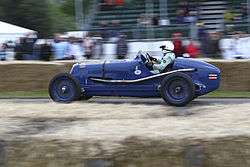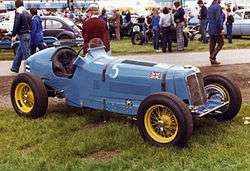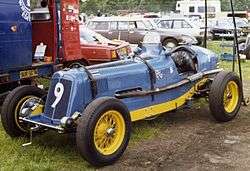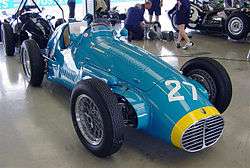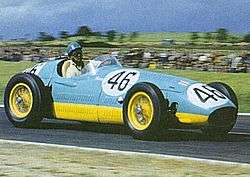Birabongse Bhanudej
| Birabongse Bhanudej | |||||
|---|---|---|---|---|---|
| Prince of Siam (later Thailand) | |||||
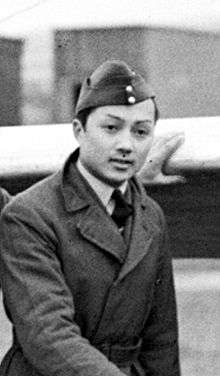 Birabongse in 1944 | |||||
| Born |
15 July 1914 Grand Palace, Bangkok, Thailand | ||||
| Died |
23 December 1985 (aged 71) Barons Court Station, London | ||||
| Spouse |
Ceril Heycock (1st) (1938–1949) Chelita Howard (1951–1956) Salika Kalantananda (1957) Arunee Chuladakoson (1959–1964) Chuanchom Chaiyananda (1967–1980) Ceril Heycock (2nd) (1983–1985) | ||||
| Issue |
Biradej Bhanubandh Rabibara Bhanubandh Biranubongse Bhanubandh | ||||
| |||||
| House |
House of Bhanubandh Chakri Dynasty | ||||
| Father |
Prince Bhanurangsi Savangwongse, the Prince Bhanubandhubongse Voradej | ||||
| Mother |
Mom Lek Bhanubandh na Ayudhya (née Yongchaiyudh) | ||||
| Formula One World Championship career | |||||
| Nationality | Thai | ||||
| Active years | 1950 – 1954 | ||||
| Teams | Enrico Platé, Gordini, Connaught, Maserati, Scuderia Milano | ||||
| Entries | 19 | ||||
| Championships | 0 | ||||
| Wins | 0 | ||||
| Podiums | 0 | ||||
| Career points | 8 | ||||
| Pole positions | 0 | ||||
| Fastest laps | 0 | ||||
| First entry | 1950 British Grand Prix | ||||
| Last entry | 1954 Spanish Grand Prix | ||||
| 24 Hours of Le Mans career | |||||
| Participating years | 1939, 1954 | ||||
| Teams |
Raymond Sommer Aston Martin | ||||
| Best finish | DNF (1939, 1954) | ||||
| Class wins | 0 | ||||
Prince Birabongse Bhanudej Bhanubandh (born 15 July 1914 – 23 December 1985), better known as Prince Bira of Siam (now Thailand) or by his nom de course B. Bira, was the first and remains the only Thai to drive in Formula One. He raced in Formula One and Grand Prix races for the Maserati, Gordini, and Connaught teams, among others. He also was an Olympic sailor in the Melbourne Olympics, 1956 in the Star, Rome Olympics, 1960 in the Star, Tokyo Olympics, 1964 in the Dragon and the Munich Olympics, 1972 in the Tempest.[1] In the 1960 Games he competed against another former Formula One driver, Roberto Mieres, who finished 17th, ahead of the prince at 19th. Birabongse was the only Southeast Asian driver in Formula One until Malaysia's Alex Yoong joined Minardi in 2001. Prince Bira was not only a racing driver, he was also a pilot of gliders and powered aircraft. In 1952 he flew from London to Bangkok in his own twin engine Miles Gemini aircraft.
Early life
Prince Birabongse's parents were Prince Bhanurangsi Savangwongse and his second wife. Birabongse's paternal grandfather was King Mongkut, loosely portrayed in the Hollywood movies The King and I and Anna and the King. His mother died when Prince Birabongse was only four years old.[2] Birabongse was sent to Europe in 1927 to complete his education in England at Eton College, where he joined one of his nephews, a grandchild of his father through his first marriage.[2] While he was at Eton Bira's father died, leaving him an orphan. He was placed under the care of his cousin, Prince Chula Chakrabongse, who ultimately became Prince Bira's legal guardian. On leaving Eton at age 18, in early 1933, Prince Bira moved in with Prince Chula in London, while he decided on his future.
Prince Birabongse had been registered to attend Trinity College, Cambridge, but on leaving school had not yet passed the Cambridge University entrance examination.[2] Initially, Prince Chula hired a tutor for Prince Bira, to better prepare him for the exam, but Prince Bira changed his mind and expressed a desire to learn sculpture rather than attend university.[2] Prince Chula approached leading sculptor Charles Wheeler, and Wheeler took Prince Bira on as a pupil within his studio. Although Prince Bira showed some talent as a sculptor, in Wheeler's opinion he needed to learn to draw, and so in the autumn of 1934 Prince Bira enrolled at the Byam Shaw School of Art. Prince Birabongse did not attend the Byam Shaw School for very long, but while there he became friendly with a fellow student, Ceril Heycock, and he began courting her in earnest only a few weeks later. However, both Prince Chula and her parents placed severe limitations on their relationship, and it was not until 1938 that they were able to marry.[2]
Racing career pre-World War II
Bira first raced with his cousin Prince Chula's team, White Mouse Racing, driving a Riley Imp at Brooklands in 1935. In this car Bira established the national motor racing colours of Siam: pale blue with yellow. He later lived near Geneva, Switzerland, and in the south of France.
Later in 1935, Prince Chula gave him one of the new ERA voiturette racing cars—R2B, which was nicknamed Romulus. Bira finished second in his first ever race in Romulus, despite needing to stop for repairs. The remaining races of the season saw Bira consistently placing among the more powerful Grand Prix vehicles, with another second place, and fifth at the Donington Grand Prix.
For 1936 the princes decided that the previous season's results merited a second ERA. They purchased chassis R5B (which Bira named Remus) to use in British events and retained Romulus for international races. Chula also purchased a Maserati 8CM to complete the White Mouse roster. Bira's expertise behind the wheel earned him the Coupe de Prince Rainier at Monte Carlo. Bira won a further four races in the ERAs that season, and took the Grand Prix Maserati to 5th at Donington and 3rd at Brooklands. This was the high point for Bira and the White Mouse team.
Following Dick Seaman's move to Mercedes for 1937, the Thais purchased his Grand Prix Delage and all of its spare parts, along with a second Delage. Despite several upgrades, and hiring experienced race engineer and future Jaguar team manager Lofty England, the cars underperformed, and on many occasions Bira raced in the older and by now substantially inferior ERAs. In addition, the money spent on the Delage upgrades had sapped the resources of the team and corners were being cut in the ERA's race preparations. Later in the year White Mouse did invest in a newer C-Type ERA, chassis R12C. R12C came to be known as Hanuman, and Bira attached a large, embossed, silver badge depicting the Hindu deity after whom he had named the car. Following a major accident in 1939 Hanuman was rebuilt back to B-Type specifications, and in light of this major overhaul Bira renamed the car Hanuman II.
While Bira maintained a respectable results tally in British events, the more costly international races were largely a disaster.
Post-war
After the war, Bira returned to racing with several teams. In 1951 he raced in an old 4CLT fitted with a newer V12 Osca engine. No results were obtained this year as a result of the poor performance of the car combined with a severe accident. By 1954, with some newer gear, a Maserati 250F, he won the Grand Prix des Frontières on the Chimay road circuit and then finished fourth in the 1954 French Grand Prix with his own Maserati. In January 1955, he won the New Zealand Grand Prix at Ardmore; he retired at the end of that season.
Prince Bira died at Barons Court tube station in London on 23 December 1985. He fell down with a heart attack, and no one knew who this old Asian person was. A handwritten note was found in his pocket, and so Scotland Yard sent it to be analyzed at the University of London, which identified it as being written in Thai, addressed to Prince Bira. The Royal Thai Embassy was notified, which then realized that the old man was Prince Bira, a forgotten hero who had once made such an impact for Thailand and whom all Siamese knew. A Thai funeral service was held at the Wat Buddhapadipa in Wimbledon, and the prince was later cremated according to Thai and Buddhist customs.
Other honors
Bira Circuit, based just outside Pattaya, Thailand, is named after Prince Bira.
In 2016, an academic paper that reported a mathematical modeling study which assessed the relative influence of driver and machine ranked Prince Bira the forty-third best Formula One driver of all time.[3]
Development of the Thai racing colours
Prince Bira was instrumental in developing and setting the national racing colours of Thailand.
|
Racing record
Complete Formula One World Championship results
(key)
| Year | Entrant | Chassis | Engine | 1 | 2 | 3 | 4 | 5 | 6 | 7 | 8 | 9 | WDC | Points |
|---|---|---|---|---|---|---|---|---|---|---|---|---|---|---|
| 1950 | Enrico Platé | Maserati 4CLT/48 | Maserati Straight-4 s | GBR Ret |
MON 5 |
500 | SUI 4 |
BEL | FRA | ITA Ret |
8th | 5 | ||
| 1951 | Ecurie Siam | Maserati 4CLT/48 | Maserati Straight-4 | SUI | 500 | BEL | FRA DNA |
GBR | GER DNA |
ITA | NC | 0 | ||
| OSCA V12 | ESP Ret |
|||||||||||||
| 1952 | Equipe Gordini | Gordini Type 15 | Gordini Straight-4 s | SUI Ret |
500 | BEL 10 |
NC | 0 | ||||||
| Gordini Type 16 | Gordini Straight-6 | FRA Ret |
GBR 11 |
GER | NED | ITA | ||||||||
| 1953 | Connaught Engineering | Connaught Type A | Lea-Francis Straight-4 | ARG | 500 | NED | BEL | FRA Ret |
GBR 7 |
GER Ret |
SUI | NC | 0 | |
| Scuderia Milano | Maserati A6GCM | Maserati Straight-6 | ITA 11 | |||||||||||
| 1954 | Officine Alfieri Maserati | Maserati A6GCM | Maserati Straight-6 | ARG 7 |
500 | 17th | 3 | |||||||
| "B. Bira" | Maserati 250F | Maserati Straight-6 | BEL 6 |
FRA 4 |
GBR Ret |
GER Ret |
SUI | ITA | ESP 9 | |||||
| 1955 | "B. Bira" | Maserati 250F | Maserati Straight-6 | ARG | MON | 500 | BEL DNA |
NED | GBR | ITA | NC | 0 |
Non-Championship Formula One results
(key)
| Year | Entrant | Chassis | Engine | 1 | 2 | 3 | 4 | 5 | 6 | 7 | 8 | 9 | 10 | 11 | 12 | 13 | 14 | 15 | 16 | 17 | 18 | 19 | 20 | 21 | 22 | 23 | 24 | 25 | 26 | 27 | 28 | 29 | 30 | 31 | 32 | 33 | 34 | 35 | 36 | 37 | 38 | 39 | 40 |
|---|---|---|---|---|---|---|---|---|---|---|---|---|---|---|---|---|---|---|---|---|---|---|---|---|---|---|---|---|---|---|---|---|---|---|---|---|---|---|---|---|---|---|---|
| 1950 | Enrico Platé | Maserati 4CLT/48 | Maserati Straight-4 s | PAU | RIC Ret |
SRM Ret |
PAR | EMP Ret |
BAR Ret |
JER Ret |
ALB Ret |
NED 5 |
NAT Ret |
NOT | ULS | PES Ret |
STT | INT | GOO 2 |
PEN Ret | |||||||||||||||||||||||
| 1951 | "B. Bira" | Maserati 4CLT/48 | OSCA V12 | SYR Ret |
PAU | RIC 1 |
SRM Ret |
BOR 4 |
INT 17 |
PAR | ULS DNA |
SCO | NED | ALB | PES | BAR | GOO | ||||||||||||||||||||||||||
| 1952 | Equipe Gordini | Gordini Type 15 | Gordini Straight-4 s | RIO | SYR | VAL | AUS | RIC | LAV | PAU WD |
IBS | MAR 2 |
AST | INT 6 |
ELA | NAP | EIF | PAR Ret |
AGP NC |
FRO | ULS Ret |
MOZ | LAC 5 |
WEC | MAR 4 |
SAB 4 |
CEA | DMT | COM | NAT | BAU | MOD | CAD | SKA | MAD | AVU | JOE | NEW | RIO | ||||
| 1953 | Scuderia Milano | Maserati A6GCM | Maserati Straight-6 | SYR | PAU | LAV | AST | KMS | INT 4 |
ELA | NAP | ULS | WIN | COR | FRO Ret |
SNE | EIF 11 |
AGP | COU | PGG | WEC | MID | ROU DNA |
HAL | CRY | AVU Ret |
USA | LAC | DRE | BRI | MCM | SAB | NEW | CAD | SAC | RED | SKA | LON | MOD | MAD | BER | JOE | CUR |
| 1954 | Officine Alfieri Maserati | Maserati A6GCM | Maserati Straight-6 | RIO | NZM | BUE | SYR DNS |
PAU | LAV | BOR Ret |
INT Ret |
BAR 6 |
CUR | ROM | FRO 1 |
COM | BAF | CRY | ROU 2 |
CEA 4 |
AUG | COM | OUL | RED | PES 2 |
SAC | JOE | CAD | GBE | GOO | DAI |
Ancestry
| Ancestors of Birabongse Bhanudej | ||||||||||||||||||||||||||||||||||||||||||||||||||||||||||||||||||||||||||||||||||||||||||||||||||||||||||||||||||||||||||||||||||||||||||||||||||||||||||||||||||||||||||||||||||||||||||||||||||||||||||||||||||||||||||||||||||||||||||||||||||||||||||||||||||||||||||||||||||||||||||||||||||||||||||||||||||||||||||||||||||||||||||||||||||||||||||||||||||||||||||||||||||||||||||||||||||||||||||||||||||||||||||||||||||||||||||
|---|---|---|---|---|---|---|---|---|---|---|---|---|---|---|---|---|---|---|---|---|---|---|---|---|---|---|---|---|---|---|---|---|---|---|---|---|---|---|---|---|---|---|---|---|---|---|---|---|---|---|---|---|---|---|---|---|---|---|---|---|---|---|---|---|---|---|---|---|---|---|---|---|---|---|---|---|---|---|---|---|---|---|---|---|---|---|---|---|---|---|---|---|---|---|---|---|---|---|---|---|---|---|---|---|---|---|---|---|---|---|---|---|---|---|---|---|---|---|---|---|---|---|---|---|---|---|---|---|---|---|---|---|---|---|---|---|---|---|---|---|---|---|---|---|---|---|---|---|---|---|---|---|---|---|---|---|---|---|---|---|---|---|---|---|---|---|---|---|---|---|---|---|---|---|---|---|---|---|---|---|---|---|---|---|---|---|---|---|---|---|---|---|---|---|---|---|---|---|---|---|---|---|---|---|---|---|---|---|---|---|---|---|---|---|---|---|---|---|---|---|---|---|---|---|---|---|---|---|---|---|---|---|---|---|---|---|---|---|---|---|---|---|---|---|---|---|---|---|---|---|---|---|---|---|---|---|---|---|---|---|---|---|---|---|---|---|---|---|---|---|---|---|---|---|---|---|---|---|---|---|---|---|---|---|---|---|---|---|---|---|---|---|---|---|---|---|---|---|---|---|---|---|---|---|---|---|---|---|---|---|---|---|---|---|---|---|---|---|---|---|---|---|---|---|---|---|---|---|---|---|---|---|---|---|---|---|---|---|---|---|---|---|---|---|---|---|---|---|---|---|---|---|---|---|---|---|---|---|---|---|---|---|---|---|---|---|---|---|---|---|---|---|---|---|---|---|---|---|---|---|---|---|---|---|---|---|---|---|---|---|---|---|---|---|---|---|---|---|---|---|---|---|---|---|---|---|---|---|---|---|---|---|---|---|---|---|---|---|---|---|---|---|---|---|---|---|
| ||||||||||||||||||||||||||||||||||||||||||||||||||||||||||||||||||||||||||||||||||||||||||||||||||||||||||||||||||||||||||||||||||||||||||||||||||||||||||||||||||||||||||||||||||||||||||||||||||||||||||||||||||||||||||||||||||||||||||||||||||||||||||||||||||||||||||||||||||||||||||||||||||||||||||||||||||||||||||||||||||||||||||||||||||||||||||||||||||||||||||||||||||||||||||||||||||||||||||||||||||||||||||||||||||||||||||
References
| Wikimedia Commons has media related to Birabongse Bhanudej. |
- ↑ Viva F1. "Formula One at the Olympics". Retrieved 2012-07-26.
- 1 2 3 4 5 Birabongse, Princess Ceril (1998). The Prince and I: My Life with Prince Bira of Siam. Veloce Publishing. p. 224. ISBN 978-1-845845-69-8.
- ↑ Mike Hanlon. "The Top 50 F1 drivers of all time, regardless of what they were driving". Gizmag.com. Retrieved 2016-05-12.
External links
- Bira, the Grand Prix driver text: Autocourse site
- Malcolm Campbell and Prince Bira photo: The Brooklands Society site
- pre-war pictures many photos: The Brooklands Society site
- His personal life text.
- A brief biography grandprix.com
- Snellman, L. 2000. The Prince and I, 8W.
- Prince Bira at The Crittenden Automotive Library, full F1 race-by-race statistics
- Bira International Circuit
- "Blue Wings to Bangkok" written by Prince Bira 1953
